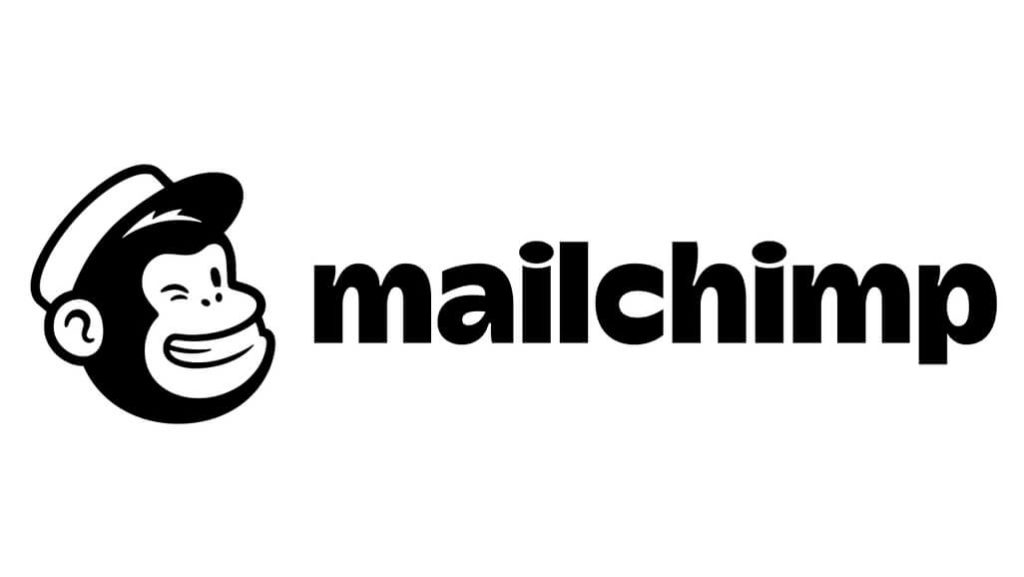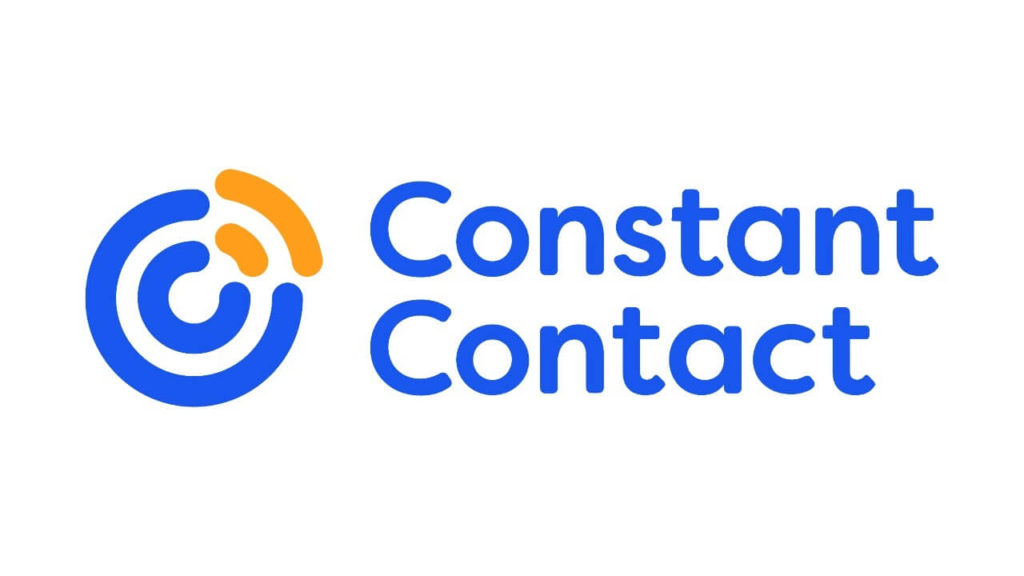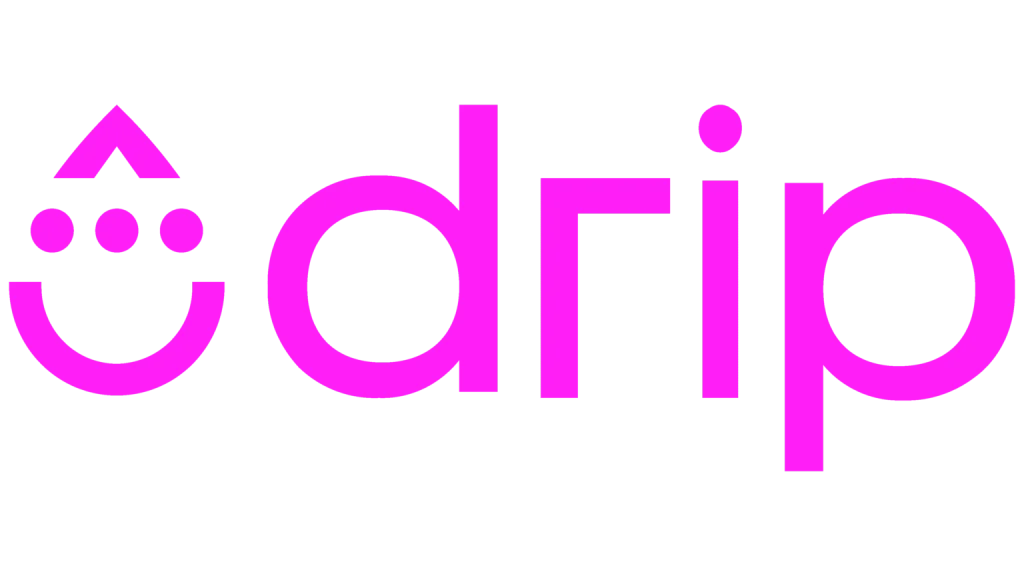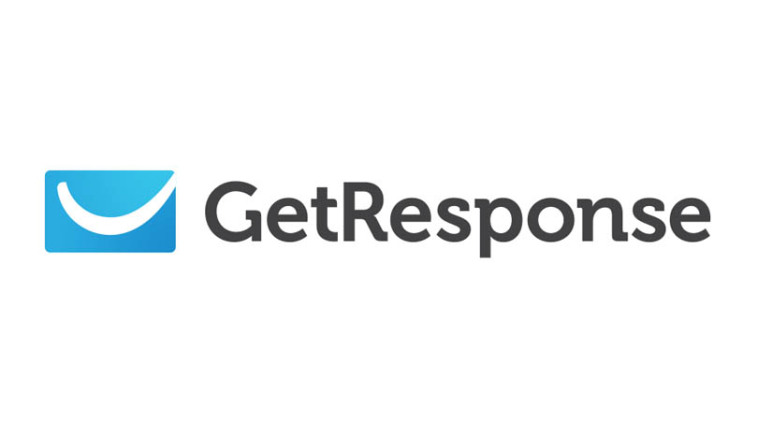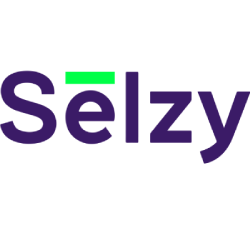Ever paid for an email tool, only to realize it’s too difficult to use? Slow dashboard, bad deliverability, hidden costs, or any other inconvenience…
We’ve been in the industry for over a decade and understand which email marketing platforms actually work and which are all hype.
If you’re looking for an email platform that delivers results without frustration—you’re in the right place.
We’ll break down the best tools for 2025, comparing features, pricing, and what truly makes them stand out. No fluff. No misleading claims. Just honest insights to help you make the right choice.
Best Email Marketing Platforms in 2025
- Sender – Ideal for Effective Email Marketing Campaigns
- Omnisend – Top Choice for Ecommerce Marketing Automation
- Brevo – Leading Email Marketing Platform for Ecommerce
- Klaviyo – Advanced Email Automation with Premium Features
- HubSpot – Enterprise Email Marketing Solution
- Mailchimp – Popular Email Marketing Platform for Customer Journeys
- Kit – Ideal Email Advertising Platform for Startups
- ActiveCampaign – Powerful Contact Management Features
- SendX – Intuitive and Affordable Email Marketing Tool
- Constant Contact – Email Platform with landing page builder
- DRIP – Top-Tier Automated Email Marketing Software
- GetResponse – Comprehensive Email Campaign Tools
- EmailOctopus – Best Newsletter Platform for Small Business
- Selzy – Email Marketing Platform Tailored for Small Businesses
- Mailmodo – Leading Solution for Interactive Emails
Comparison Table of Top Email Marketing Services
Before moving to detailed comparisons, let’s quickly compare the costs of using different email marketing platforms.
Here’s a table that provides a quick snapshot of all the popular email marketing services.
| Platform | Cost for 1,000 subscribers | Free plan | Best features | Best for |
| Sender | Starts at $8/mo | Yes. Up to 2,500 subscribers and 15,000 emails/month | Premade automation sequences | Best for any online business |
| Omnisend | Starts at $20/mo | Yes. Up to 250 subscribers and 500 emails/month | Ecommerce review automation | Shopify store owners |
| Brevo | Starts at $8/mo | Yes. For up to 300 emails/day | WhatsApp marketing | Ecommerce brands |
| Klaviyo | Starts at $45/mo | Yes. For up to 250 contacts | Mobile push notifications | Shopify stores |
| HubSpot | Starts at $20/mo | 14-day trial only | Free CRM & funnel builder | B2B startups |
| Mailchimp | Starts at $29/mo | Yes. For up to 500 subscribers and 1,000 emails/month | Landing page builder | Email marketing beginners |
| Kit | Starts at $25/mo | Yes. Limited to 1 basic visual automation and 1 email sequence only | Digital product selling features | Newsletter creators and podcasters |
| ActiveCampaign | Starts at $15/mo | 14-day trial only | Sales automation & CRM | Sales oriented organizations |
| SendX | Starts at $9.99/mo | 14-day trial only | Built-in heatmap reports | Startups and small businesses |
| Constant Contact | Starts at $30/mo | Yes. Trial only for 100 email sends | CRM dashboard | Nonprofits and local organizations |
| Drip | Starts at $39/mo | No | Revenue tracking and attribution | Ecommerce stores |
| GetResponse | Starts at $19/mo | 30-day trial only | Conversion funnel builder | Coaches and B2B marketers |
| EmailOctopus | Starts at $12/mo | Yes. Up to 2,500 subscribers | Amazon SES integration | Solopreneurs & freelancers |
| Selzy | Starts at $10/mo | Yes. Up to 2,000 subscribers | Readymade automation chains | Small business owners |
| Mailmodo | Starts at $39/mo | No. 21-day free trial only | AMP email builder | D2C brands and event organizers |
15 Best Email Marketing Platforms in 2025
If you’re searching for the right provider for your business, you’ve come to the right place.
We’ve tried every email marketing platform on this list and listed their features, pros, cons, and prices to fast-track your decision.
Let’s look at the best email marketing providers one by one.
Sender – Ideal for Effective Email Marketing Campaigns
If you need powerful software for your email and SMS campaigns, Sender should be your top pick. Whether you’re a beginner or a pro, this bulk email software makes marketing effortless. It has an intuitive dashboard and offers premium email marketing features, even on the free plan.
Pricing: Starts at $8/month for up to 1,000 subscribers and 12,000 emails/month | Forever free plan available.
Sender nails the balance between simplicity and power. Its drag-and-drop email builder makes designing emails a breeze. A rich gallery of responsive templates saves time when you lack inspiration and ensures your emails look perfect on any device.
It offers pre-made workflows for all scenarios — welcome sequences, abandoned cart emails, referral campaigns, etc. Plus, the flows are customizable using the visual automation builder and the quick human support is a lifesaver when you need instant help.
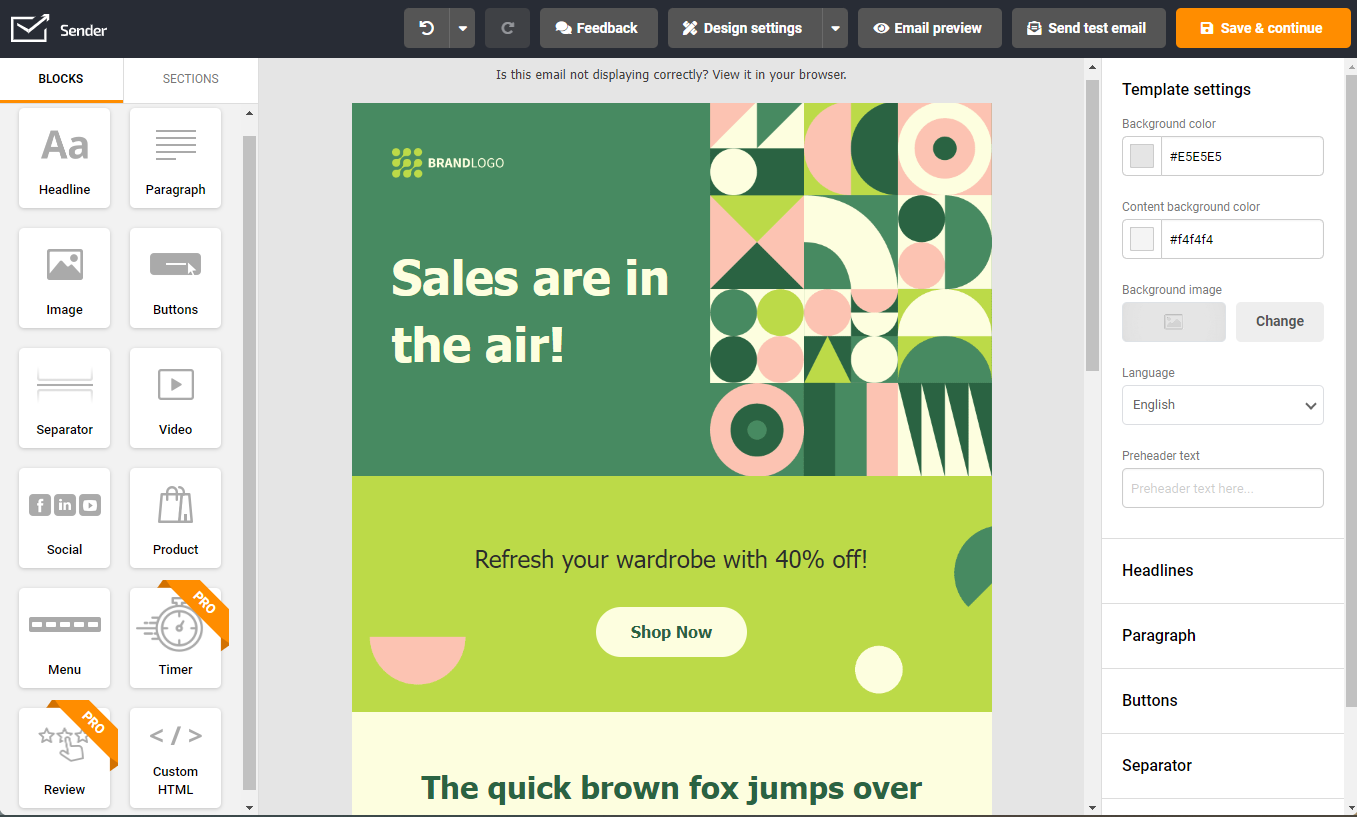
Standout Features
- Premade automation workflows. Easily set up drip campaigns, follow-ups, and nurture sequences;
- Segmentation & personalization. Create hyper-targeted campaigns based on customer behavior;
- Advanced email analytics. Real-time reporting with heatmap analysis for tracking engagement.
Use Cases
Sender is perfect for businesses that need an omnichannel solution for email and SMS for their business. Some of the most rewarding use cases include:
- Ecommerce. Recover lost sales with automated cart abandonment sequences;
- Startups & SMBs. Set up automated follow-up campaigns for lead generation and nurturing;
- Bloggers & content creators. Engage subscribers with personalized newsletters.
Competitive Edge
Unlike clunky, overpriced tools, Sender offers top-tier automation and deliverability at a budget-friendly price. Compared to other tools, its automation builder is faster and is available on the free plan too. Plus, it offers omnichannel campaign support for ecommerce email marketing, too. You can scale your marketing efforts without overspending on subscriptions when you choose Sender.
Amazing UI. It is super easy to use if you want to do Email Automation. Other tools are super expensive and pack a bunch of features that you don’t need. Or else, they are completely useless and buggy.
— Deepu from Capterra
Omnisend – Top Choice for Ecommerce Marketing Automation
Omnisend is an all-in-one marketing platform for ecommerce, offering online merchants powerful automation and omnichannel capabilities. But ecommerce brands need more than just email blasts—they need intelligent automation. That’s what Omnisend promises.
Pricing: Starts at $20/month for up to 1,000 contacts and up to 12,000 emails/month | Free plan available.
After testing multiple platforms, we found Omnisend’s automation tools are designed, specially for ecommerce stores. There are pre-built automation workflows for cart recovery, welcome sequences, and product recommendations.
Plus, you can combine email, SMS, and push notifications for a unified customer experience. It offers behavioral automation triggers and deep integrations with platforms like Shopify, WooCommerce, and BigCommerce to ensure you never miss a sales opportunity.
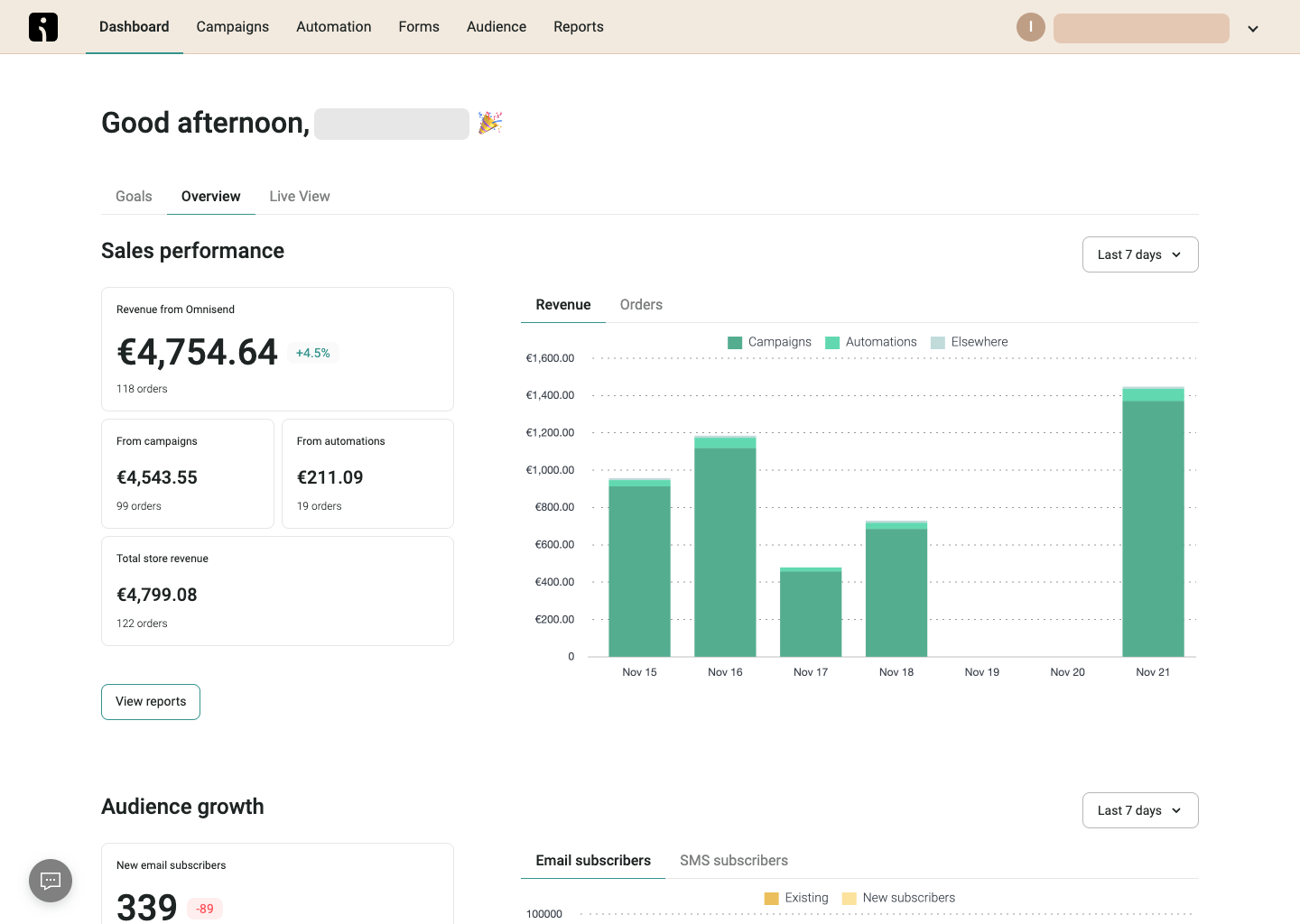
Standout Features
- Multi-channel campaigns. Manage email, SMS, and push notification campaigns in one platform;
- Ecommerce review automation. Set up automated review requests for gathering social proof;
- Advanced segmentation. Target based on purchase history, engagement, and browsing behavior.
Use Cases
Omnisend is built for ecommerce brands that need smart automation to increase conversions and customer retention. Particularly, it’s a great fit for:
- Shopify stores. Automate promotional emails, cart recovery emails, and review requests;
- DTC brands. Drive repeat sales with personalized product recommendation emails and push notifications;
- Subscription businesses. Manage renewal reminders and automated product newsletters.
Competitive Edge
Many email tools claim to serve ecommerce, but Omnisend is built for it from the ground up. Compared to generic email marketing services, it offers better automation features, deeper store integrations, and a smoother omnichannel experience. If you run an online store and want a simple automation builder for different channels, you should check out Omnisend.
Overall, my experience with Omnisend has been good. It’s easy to use, with helpful email and SMS automation, and the templates save time. While design options are a bit limited and costs can rise as your list grows, it’s a solid tool for marketing.
— Dauanie from Capterra
Brevo – Leading Email Marketing Platform for Ecommerce
Running an ecommerce business? You need an omnichannel marketing suite with multiple tools. Brevo simplifies ecommerce marketing with a mix of email automation, web and push notifications, and an integrated CRM.
Pricing: Starts at $8/month for up to 5,000 monthly emails | Free plan available.
Whichever Brevo review you read, you’ll find special mentions about its customer data platform and automation builder. It offers stores a unified inbox to keep an eye on interactions across email, WhatsApp, and SMS.
Plus, its drag-and-drop editor and ready-to-use automated workflows for cart abandonment and re-engagement campaigns make designing emails quick and easy.
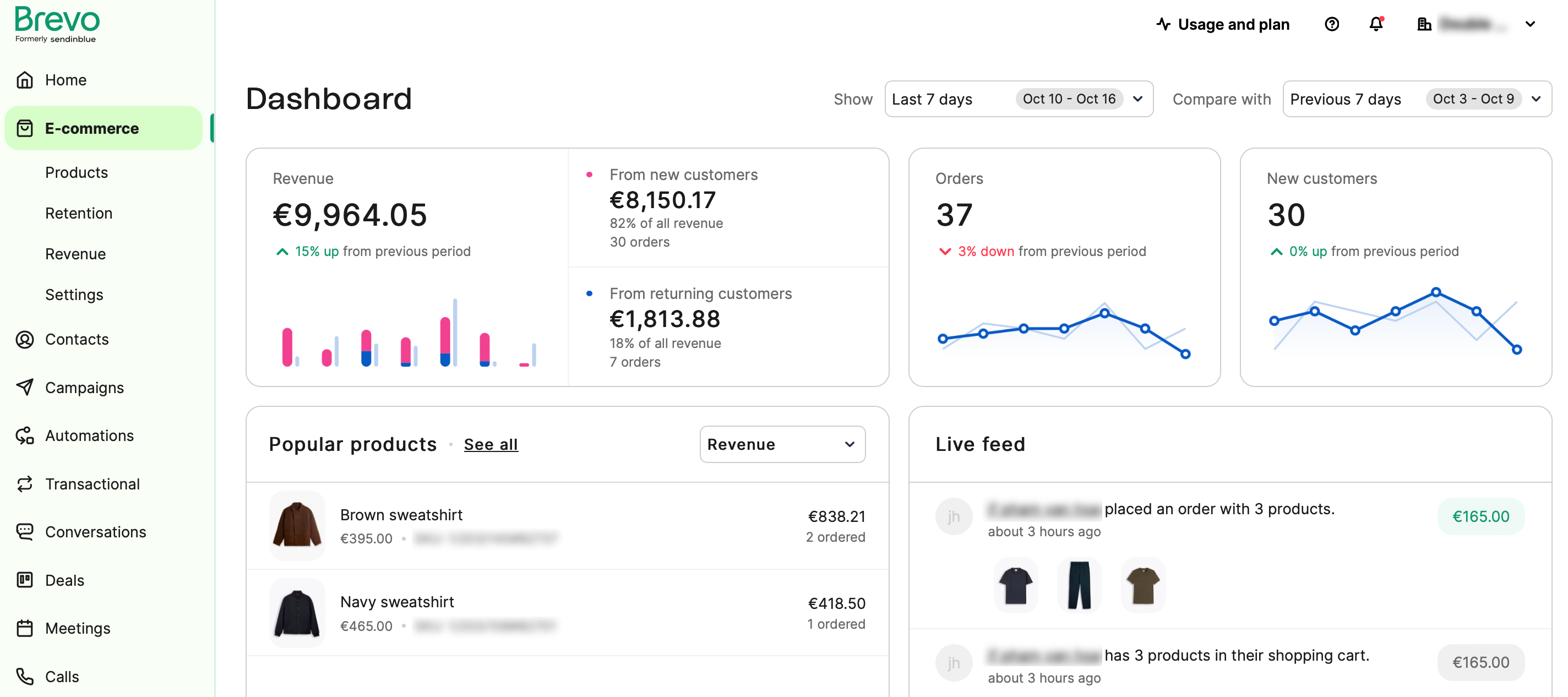
Standout Features
- Dynamic segmentation. Group subscribers based on real-time shopping behavior;
- Email, SMS, push notifications. Combine more messaging channels for better engagement;
- WhatsApp integration. Plan personalized messages on WhatsApp right from the dashboard.
Use Cases
Brevo is best for ecommerce brands looking for a unified marketing platform. It works well for:
- Growing ecommerce stores. Set up multi-channel engagement and nurturing campaigns to grow customer lifetime revenue;
- Retailers with repeat customers. Send personalized newsletters to boost engagement and share promotions across channels;
- Businesses using SMS marketing. Sync email and SMS campaigns effortlessly and manage all interactions from the same dashboard.
Competitive Edge
Many platforms focus only on email or offer SMS marketing as a costly add-on. Brevo combines both in an affordable package, making it ideal for ecommerce brands that look for multi-channel marketing.
I’ve had an amazing experience with Brevo! I love the automations, the stats, and the notifications it provides. The double opt-in feature is my favorite, and I use it a lot for easy email subscriptions.
— Kudakwashe from Capterra
Also read: 10 Brevo Alternatives in 2025: Features, Pricing, and Reviews
Klaviyo – Advanced Email Automation with Premium Features
If you’re serious about email automation and customer data management, Klaviyo is quite useful. Its deep data tracking capabilities, advanced segmentation tool, and AI-driven insights makes behavioral marketing easier.
Pricing: Starts at $45/month for up to 1,000 contacts and up to 15,000 emails/month | Free plan available.
Klaviyo is built for businesses that need event-based automation. It’s useful for triggering emails based on specific actions—like when a customer abandons a cart, browses a product, or completes a purchase.
Its predictive analytics dashboard is quite useful for growing businesses. Klaviyo can forecast a customer’s next purchase date, lifetime customer value, and even churn risk, helping businesses send personalized offers before they even think about buying.
Plus, its tight integration with Shopify, Magento, and WooCommerce saves a lot of time for store owners.
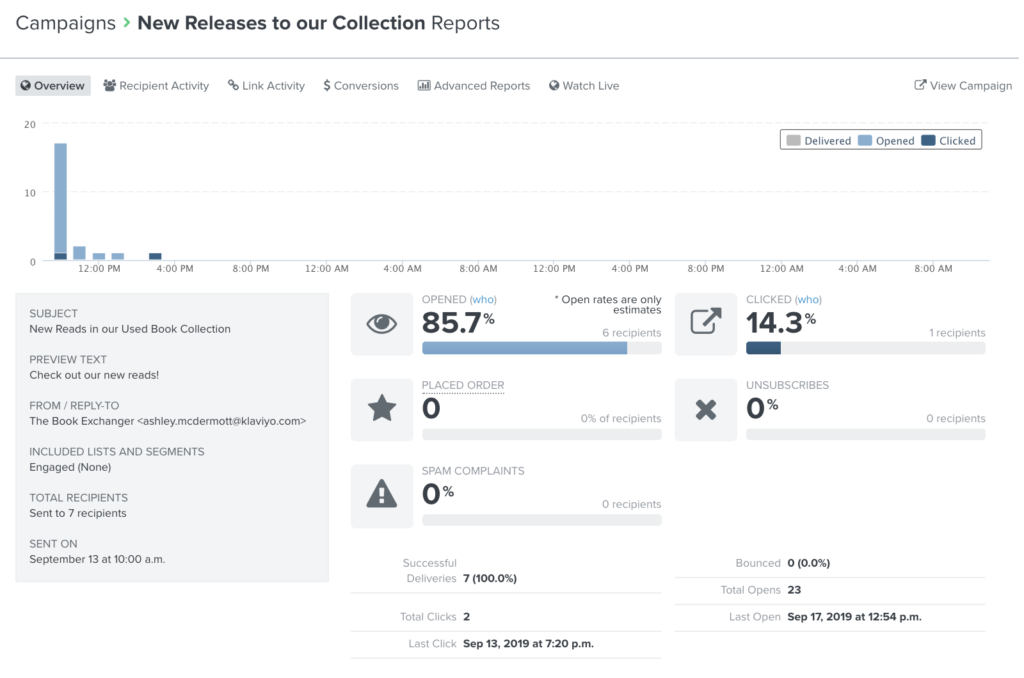
Standout Features
- Behavioral triggers. Automate emails based on customer activity in real time;
- Predictive analytics. Forecast revenue and customer lifetime value with AI insights;
- Custom segmentation. Group subscribers using deep data, from browsing history to purchase patterns.
Use Cases
Klaviyo is a useful solution for brands that want deep automation and email personalization tools. It’s ideal for:
- Scaling ecommerce brands. Use contact data to create hyper-personalized email and SMS campaigns;
- Subscription businesses. Automate retention emails based on churn risk prediction;
- High-volume retailers. Personalize emails and SMS interactions using AI-based suggestions.
Competitive Edge
Klaviyo doesn’t just send emails—it helps predict who will buy and when. The ability to use AI-driven insights, advanced triggers, and real-time customer data makes Klaviyo a smart marketing automation solution. If you want campaigns that feel tailored and strategic, this is an interesting pick.
Klaviyo is an excellent tool for our email campaigns, offering seamless integration with Shopify and powerful segmentation features. The intuitive interface allows us to create automated flows easily, helping us target our audience effectively and drive conversions. Highly recommended!
— Shayne from Capterra
HubSpot – Enterprise Email Marketing Solution
When it comes to scaling email marketing for large businesses, HubSpot makes its mark. It’s more than just an enterprise email marketing solution — it’s a full CRM-driven marketing engine that connects email, automation, and sales seamlessly.
Pricing: Starts at $20/month for up to 1,000 contacts and up to 5,000 emails/month | Free plan available.
HubSpot offers every tool you need to personalize customer engagement efforts. The visual automation builder allows you to create complex drip sequences. Plus, its CRM-powered segmentation ensures that every email is hyper-personalized.
The biggest advantage? Detailed campaign analytics that track not just opens and clicks, but also how emails contribute to overall revenue.

Standout Features
- CRM-integrated automation. Email campaigns adapt based on real-time customer interactions;
- AI-powered personalization. Dynamic content tailored to individual user behaviors;
- Revenue attribution reports. Track a campaign’s impact on sales using detailed analytics.
Use Cases
HubSpot is ideal for businesses that need data-driven email marketing. You can use it effectively for:
- Enterprises & large teams. Manage complex workflows across multiple departments;
- B2B companies. Align email marketing efforts with sales process for lead nurturing & follow-ups;
- High-growth SaaS brands. Nurture leads with hyper-personalized and well-timed drip sequences.
Competitive Edge
HubSpot is built for teams that need cross-functional collaboration, detailed insights, and enterprise-level automation. Unlike standalone email platforms, HubSpot connects marketing, sales, and customer data in a single ecosystem—making it a true end-to-end marketing powerhouse.
So, if you deal with complex funnels and need advanced CRM integrations, pick HubSpot for managing everything seamlessly.
I have a great experience with Hubspot Marketing. I do a mixture of operations and marketing duties during my day and my experience in the marketing module has helped me in areas of operations as well. The social content scheduling aspect of it has been seamless!
— Allie from Capterra
Mailchimp – Popular Email Marketing Platform for Customer Journeys
If you’ve ever Googled about email marketing services, you would’ve probably come across a Mailchimp review. With its quirky branding and numerous integrations, it has been a popular platform for businesses starting out. Mailchimp is packed with tools for simplifying newsletter creation.
Pricing: Starts at $29/month for up to 1,000 contacts and up to 18,000 emails/month | Free plan available.
Mailchimp has a simple drag-and-drop editor with lots of free templates for every kind of business. It has all the essential features you need in an email marketing solution. One area where it excels? Integrations. With 500+ integrations, you can connect Mailchimp to Shopify, WordPress, and almost any other marketing tool.
They’ve also expanded beyond email—offering appointment scheduling and AI-powered content generation. The downside? Pricing has become steeper, and the free plan has been significantly downgraded, making people look for Mailchimp alternatives.

Standout Features
- Customer journey builder. Automate multi-step workflows based on customer interactions;
- 500+ integrations. Connect Mailchimp to your favorite tools, from Shopify to Zapier;
- AI-powered email creator. Generate subject lines and email content for creating email campaigns quickly.
Use Cases
Mailchimp works best for businesses that need email marketing integrated with other tools. Here are some of the ways you can use Mailchimp:
- Ecommerce brands. Use automation to recover abandoned carts and segment customers for personalized newsletters;
- Service-based businesses. Set up appointment scheduling and customer follow-ups;
- Bloggers & content creators. Use forms and landing pages to grow and engage an audience.
Competitive Edge
While Mailchimp offers powerful integrations and has a simplified interface, its pricing model has become less appealing over time. The free plan once gave small businesses plenty of room to grow—now it’s restricted to 500 subscribers and 1,000 emails per month.
Compared to platforms like Sender or Omnisend, which offer more affordable plans, Mailchimp feels like you’re paying extra for name recognition. That said, if you need a popular platform and don’t mind the cost, Mailchimp still holds its ground. But for businesses seeking simplicity and affordability, better alternatives exist.
My overall experience with Mailchimp has been positive. It’s a well-rounded platform that makes creating and managing email campaigns straightforward and effective. While there are some limitations and the pricing could be more accessible, the platform delivers on its promise of simplifying email marketing.
— Alec from Capterra
Kit – Ideal Email Advertising Platform for Startups
If you’re a creator, freelancer, or startup looking for an email marketing tool that helps you monetize and grow, Kit is worth a serious look. We’ve seen it evolve from a simple newsletter tool into a full-fledged email advertising platform built to help small businesses grow.
Pricing: Starts at $25/month for 1,000 subscribers and unlimited emails | Free plan available.
Kit goes beyond standard email marketing—it’s designed to help you automate campaigns and grow your audience. You can charge your subscribers for premium newsletter editions, sell digital products, and even find sponsorship deals.
The automation tools are simple yet effective, making it easy to set up email sequences that nurture new subscribers based on their behavior. The landing page editor? Basic but functional. It won’t replace a dedicated page builder, but it does the job for capturing leads.
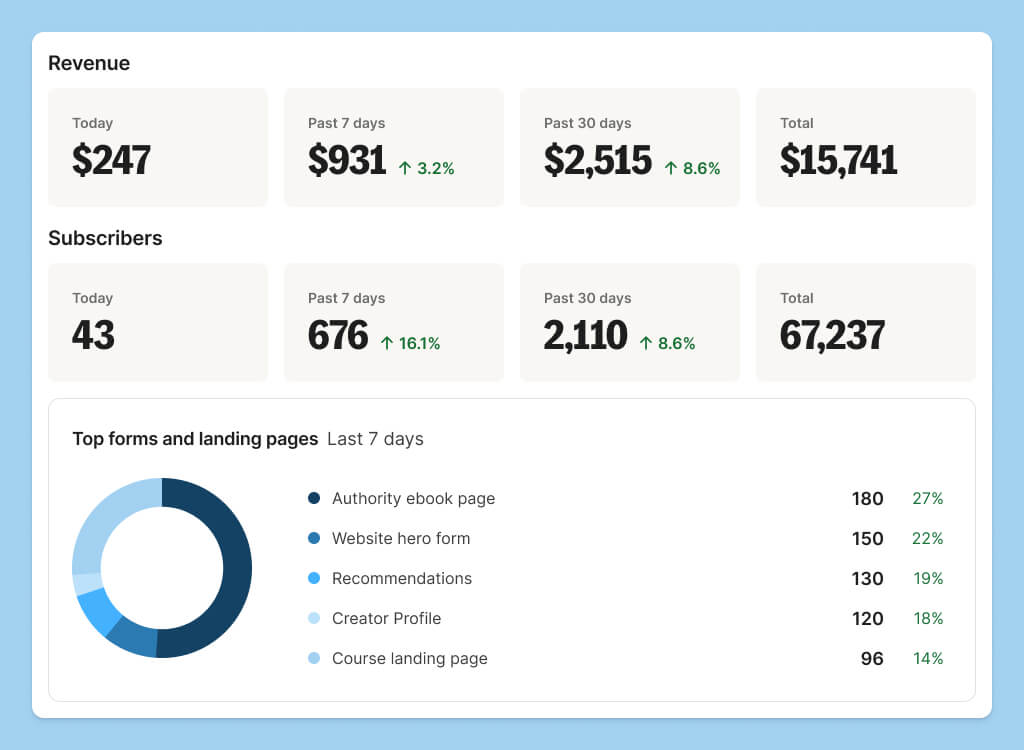
Standout Features
- Built-in monetization tools. Sell digital products, paid newsletters, and accept tips directly with Kit;
- Visual automation builder. Create email sequence based on subscriber actions with a drag-and-drop builder;
- Creator network. Partner with other creators to cross-promote and grow your audience.
Use Cases
Kit is perfect for startups and solo creators looking for an easy-to-use email marketing solution with built-in monetization options. It works well for:
- Content creators & bloggers. Monetize your newsletter while growing an audience organically;
- Freelancers & coaches. Sell digital products and automate email sequences to nurture clients;
- Bootstrapped startups. Affordable automation to nurture leads and engage potential customers.
Competitive Edge
Unlike traditional email tools, Kit isn’t just about sending emails—it’s about helping creators make money. The ability to sell digital products and tap into sponsorship opportunities makes it stand out.
Many platforms focus solely on automation, but Kit combines marketing with monetization, making it a solid choice for startups and solo entrepreneurs who want an all-in-one growth tool without overcomplicated dashboards.
I’ve had a great experience. There is a bit of a learning curve when you first start, but Kit is a powerful email marketing tool with loads of customizations and automations that make it worth the time to learn it.
— Monica from Capterra
ActiveCampaign – Powerful Contact Management Features
ActiveCampaign is an advanced email marketing tool that brings automation, contact management, and CRM into one intuitive platform. Unlike other tools that feel bolted together, ActiveCampaign makes every part of customer engagement flow seamlessly—from triggered emails to sales tracking.
Pricing: Starts at $15/month for up to 1,000 contacts and up to 10,000 emails/month | 14-day free plan available.
ActiveCampaign is built for businesses that want more than just email marketing. Its visual automation builder helps you create customized workflows for abandoned carts, post-purchase follow-ups, and lead nurturing.
The CRM add-on is a huge plus, letting teams track leads, set up appointments, and manage deals all in one place. Its reporting tools go beyond generic insights too. You get detailed insights into subscriber behavior, purchase tracking, and even predictive recommendations.
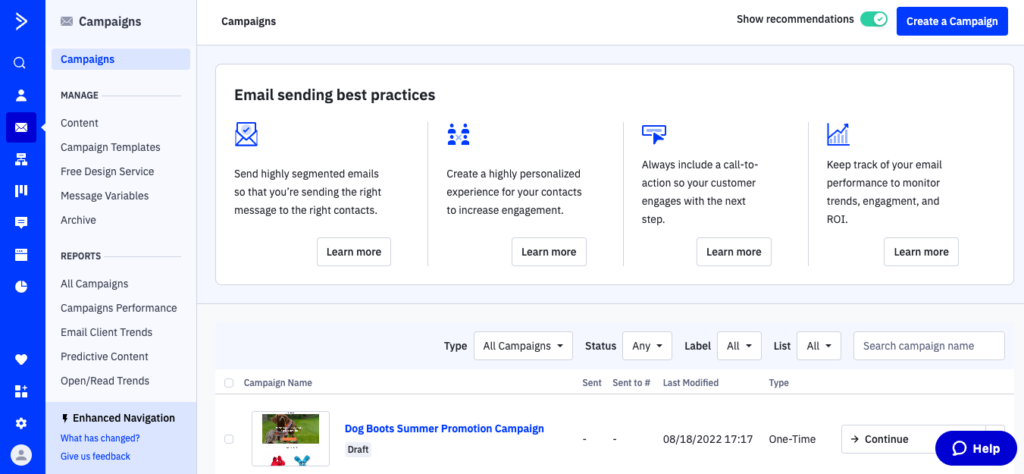
Standout Features
- Advanced sales & marketing automation. Set up workflows that trigger emails, lead scoring, and task assignments automatically;
- CRM with deal tracking. Manage customer relationships, set up pipelines, and track every interaction;
- Multi-channel messaging. Integrate SMS, Facebook ads, and even site messages for omnichannel engagement.
Use Cases
ActiveCampaign is good for you if you need seamless integration between email, sales, and automation. You can use it for different applications, including:
- Ecommerce brands. Recover abandoned carts, upsell products, and track purchase behavior;
- B2B & SaaS companies. Use lead scoring, sales follow-ups, and CRM workflows to close deals faster;
- Marketing agencies. White-label drip sequences to automate client campaigns at scale.
Competitive Edge
ActiveCampaign helps businesses map out entire customer journeys—from the first touchpoint to conversion. This helps you see which emails lead to sales, which customers are most engaged, and which automation sequences drive the highest ROI.
Unlike other platforms that sometimes can overwhelm you in the name of CRM integration, ActiveCampaign’s CRM features are really helpful. You can track every interaction a customer has with your business—whether they opened an email, visited your site, or replied to a campaign—and automate what happens next.
ActiveCampaign has made our marketing practices yield more and better results by helping us understand and adopt new personalized marketing campaigns that allow us to target customers based on their needs. This has by a greater margin seen us have a great attraction to new customers by turning potential leads to customers.
— Lydia from Capterra
SendX – Intuitive and Affordable Email Marketing Tool
If you want an email marketing tool without a complex interface, SendX is a great choice. With unlimited email sending, automation, and A/B testing at an affordable price, SendX makes it easy to run high-performing email campaigns without wasting money.
Pricing: Starts at $9.99/month for up to 1,000 contacts and unlimited contacts | 14-day free trial only.
SendX is built for efficiency and ease of use. The drag-and-drop editor makes designing emails effortless. Automation is straightforward and effective, too. You can set up drip campaigns, subscriber tagging, and A/B tests to refine your strategy.
Unlike platforms that charge extra for more advanced features, SendX offers all core email marketing tools under one affordable plan—including heatmap reports to track CTA performance.

Standout Features
- Unlimited emails on all plans. Even if you’re on the basic tier, you get access to all features and unlimited emails;
- Automation & drip campaigns. Set up email sequences to engage and convert subscribers;
- Built-in heatmap reports. Get insights into top-performing links and CTAs in your emails.
Use Cases
SendX is best for business owners looking for a simple yet powerful email marketing solution. You can use it in the following ways:
- Small businesses & startups. Scale email marketing efforts with unlimited emails per month;
- Bloggers & course creators. Automate lead nurturing and engagement sequences using its drip sequence builder;
- Ecommerce & affiliate marketers. Set up automated newsletters and track email clicks and performance.
Competitive Edge
SendX is a good solution for businesses that want to send frequent email campaigns every month. Its intuitive automation builder offers a simple way to automate campaigns. While tools like ActiveCampaign offer advanced workflows, SendX keeps it simple—you can set up email sequences, pop-up triggers, and A/B tests in minutes, without getting lost in complex settings.
However, SendX isn’t for power users. If you need complex workflows or multi-channel marketing, platforms like Sender or Brevo might be better. But if you need a straightforward, budget-friendly tool, SendX is a good option.
Very easy to use. You can get up and run in 15 mins. Lots of themes for onsite widgets and pop-ups. The email marketing automation piece is very straight forward to setup.’
— Mike from Capterra
Constant Contact – Email Platform with Landing Page Builder
Constant Contact often appears on ‘best email marketing tools’ lists and caters to specific industries rather than being a broad solution for small businesses. If you need an email platform for particular niches, it is a good solution.
Pricing: Starts at $30/month for up to 1,000 contacts and up to 10,000 emails/month | Limited-time free trial available.
It has some unique features—like event marketing, social campaign tools, and a landing page builder.
Constant Contact is easy to navigate and has a simple drag-and-drop email editor. It lets you insert RSVP buttons, polls, and product blocks into the email itself. It’s particularly useful for event companies and businesses that host regular webinars and events.
The automation and segmentation features are good, but need an upgrade to higher plans for unlocking full potential. One thing worth mentioning is its Canva integration—handy for designing email graphics without switching platforms.
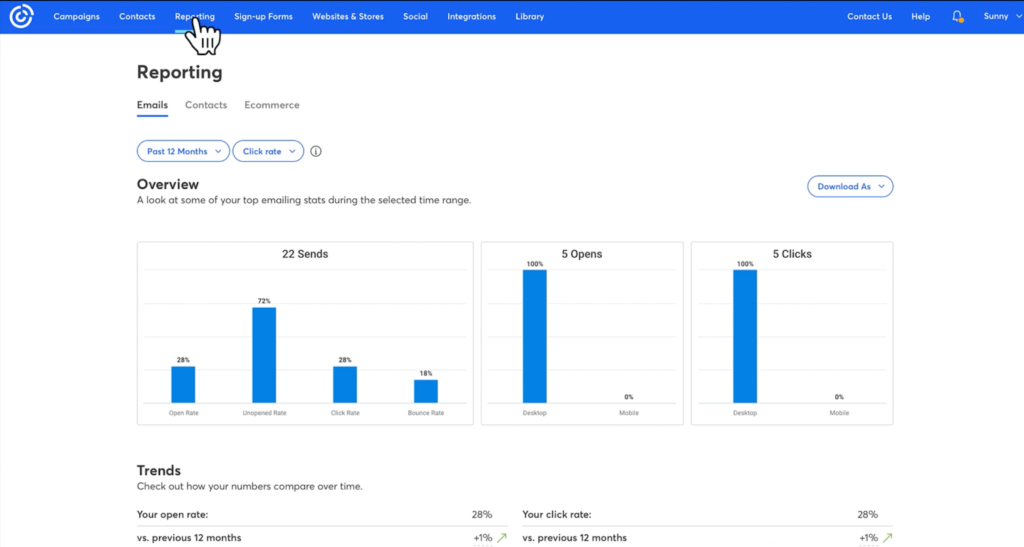
Standout Features
- Event marketing tools. Manage registrations, sell tickets, and send event reminders from a single dashboard;
- Social media integration. Schedule social media posts on different platforms;
- Pre-built audience segments. Automatically filter subscribers by activity levels.
Use Cases
Constant Contact is great for businesses that need event marketing or social media tools, along with email marketing. We can think of the following use cases for different businesses:
- Real estate agents. Send event invites for open houses and schedule client follow-ups;
- Nonprofits & local organizations. Manage fundraisers, ticketed events, and social promotions;
- Small retailers. Run basic email campaigns and segment customers by engagement.
Competitive Edge
Unlike many email platforms, Constant Contact doubles as an event management tool. If you host in-person or online events, its built-in ticketing system (with PayPal/Stripe integration) is a rare feature. But beyond that? It lags behind competitors in automation and customization.
For example, while Sender and ActiveCampaign offer advanced automation flows, Constant Contact only allows basic sequences on lower-tier plans. Even abandoned cart emails require an upgrade from the lower tier. Plus, email designs are limited, and many look outdated.
Our small business just started using Constant Contact and so far has been great. We love the templates it offers and the analytic reports. It is very user-friendly and has built in templates for which save us time and money. The only minus is that Constant Contact does not offer unlimited email sends.
— Tammy from Capterra
Also read: 10 Constant Contact Alternatives: Find Your Perfect Fit
DRIP – Top-Tier Automated Email Marketing Software
If you run an ecommerce store and want robust automation without feature bloat, Drip is a good choice. Unlike platforms that try to do everything—social ads, CRMs, landing pages, etc. — Drip focuses purely on ecommerce marketing.
Pricing: Starts at $39/month for up to 2,500 contacts and unlimited emails | No free plan or trial.
What sets Drip apart? Advanced segmentation, flexible automation tools, and deep ecommerce integrations. You can create workflows based on customer behavior, purchase history, and even quiz responses.
Unlike other tools that lock features behind expensive plans, Drip gives you full access to everything, with pricing based only on list size. Downside? No SMS, social ads, or CRM—Drip is email-only.
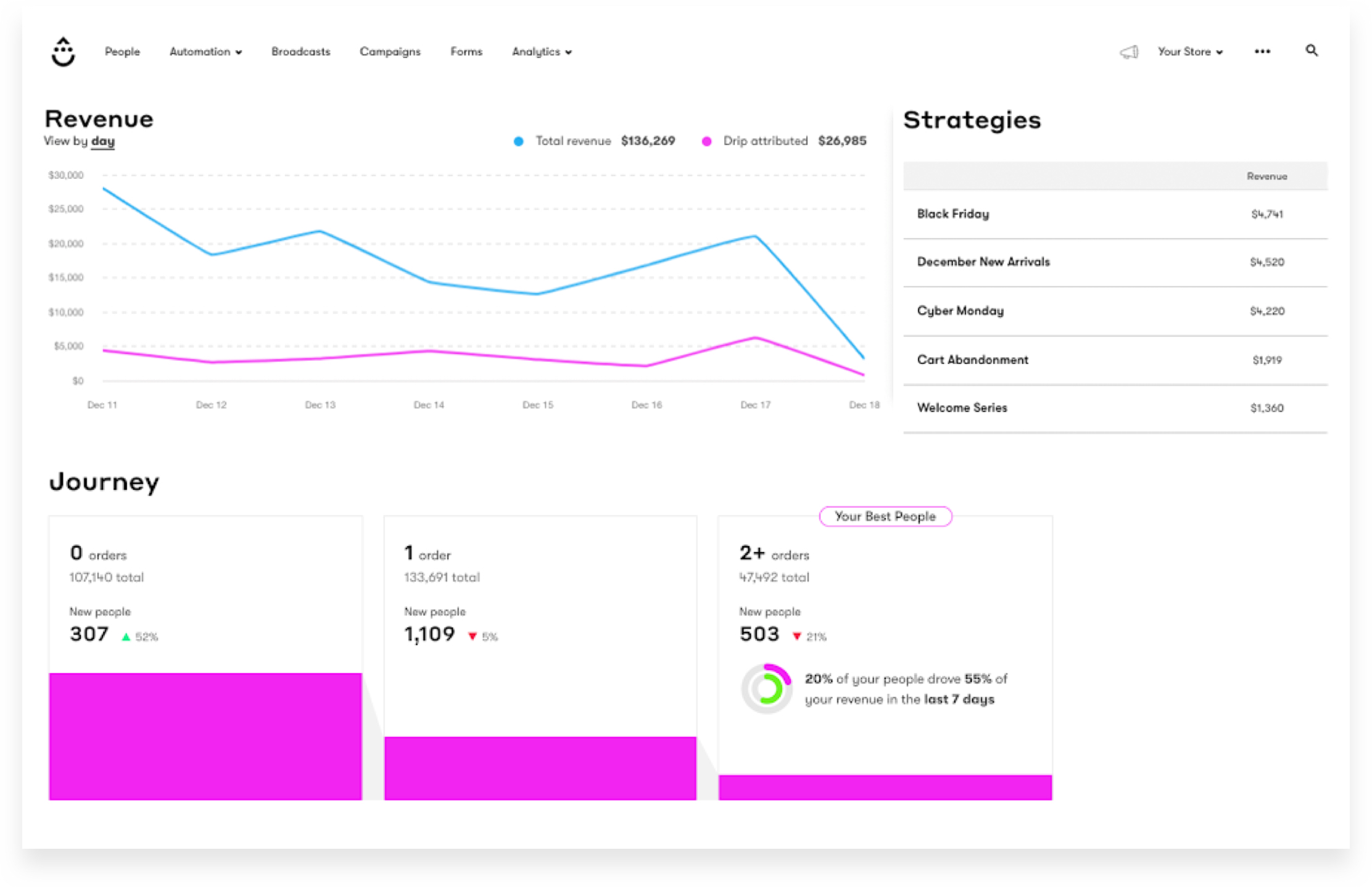
Standout Features
- Advanced segmentation. Tag and target subscribers based on their online activity or purchase behavior;
- Onsite campaigns. Use interactive signup forms with gamification, surveys, and mystery offers;
- Deep ecommerce triggers. Automate campaigns using store events (e.g., abandoned carts, VIP purchases).
Use Cases
Drip is best for ecommerce brands that want email automation built around customer behavior. It’s a strong choice for:
- Shopify stores. Set up complex automations for upsells, loyalty rewards, and cart recovery;
- Subscription box businesses. Personalize emails based on purchase frequency and churn risk;
- Ecommerce brands. Use quizzes and gamification to make email sign-ups more interactive.
Competitive Edge
While many email platforms focus on mass email blasts, Drip excels at hyper-personalization. Its advanced segmentation lets you target customers based on real shopping behavior, not just generic engagement metrics.
However, Drip isn’t perfect. Deliverability rates are lower than competitors like ActiveCampaign, and the interface can feel cluttered. Plus, it’s pricier than other email platforms—you’re paying for automation depth, not affordability.
But if you need a highly specialized ecommerce email tool that prioritizes customer engagement over bulk messaging, Drip is worth considering
Excellent. I need data to survive and I need to know what my customers are looking at. I can segment things, see which headlines work best, and give my customers a better product. Data is king, and Drip gets me the data I need to reach my audience, particularly as an established business with a large email list.
— Steven from Capterra
GetResponse – Comprehensive Email Campaign Tools
Over the years, GetResponse has evolved from a basic email platform into a full-fledged marketing hub with features like AI-powered recommendations, landing pages, and even an online course builder.
Pricing: Starts at $19/month for up to 1,000 contacts and unlimited emails | 30-day free trial available.
GetResponse makes building and automating email campaigns easy. The drag-and-drop editor offers built-in blocks for videos, call-to-action buttons, and ecommerce products.
It’s automation builder is quite useful, too. You can create workflows that trigger emails, assign lead scores, and segment contacts based on behavior. Conversion funnel is another unique tool helping you build a complete lead-to-sale journey.
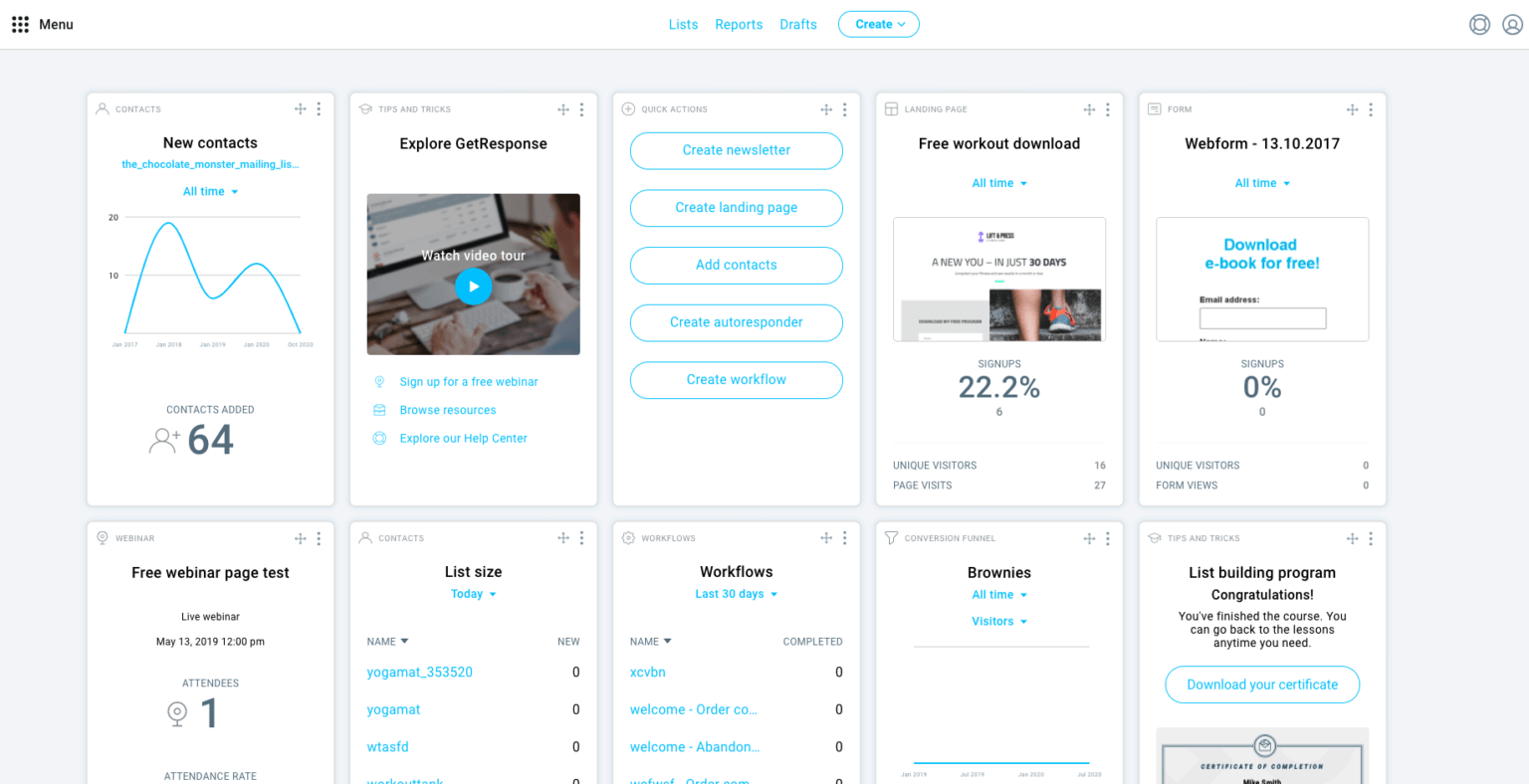
Standout Features
- AI-powered product recommendations. Tailor emails based on visitor behavior and preferences;
- Conversion funnel builder. Dedicated tools for capturing, nurturing, and converting leads;
- Online course builder. Create and host courses or digital media and promote the same from the same platform;
Use Cases
GetResponse is useful for any business that needs an all-in-one marketing tool beyond emails. We can think of the following applications:
- Ecommerce brands. Use AI product recommendations, abandoned cart emails, and sales tracking to boost conversions;
- Course creators & coaches. Sell courses and build automated email funnels to nurture prospective learners;
- B2B & SaaS companies. Plan complex email automations and integrate directly with a CRM system for lead management.
Competitive Edge
GetResponse provides a complete marketing ecosystem. Its conversion funnel feature combines lead capture, automation, and sales tracking—something most competitors don’t offer at this price point.
While tools like ActiveCampaign offer strong automation, GetResponse layers in AI to optimize email automations automatically. Plus, its landing page and webinar tools eliminate the need for third-party apps, saving businesses both time and money.
So, check it out if you need a solution with integrated tools for funnels, landing pages, and webinars.
I liked the fact it has the option of paid ads creator as well as tracking everything with analytics & contact management. It’s easy to create amazing emails, it has AI powered tools, but for me automations are very limited.
— Kiran from Capterra
EmailOctopus – Best Newsletter Platform for Small Business
If you’re a small business looking for a simple, budget-friendly newsletter tool, EmailOctopus is worth considering. Unlike platforms packed with unnecessary features, EmailOctopus focuses purely on what small businesses need—newsletters and autoresponders, without the complexity.
Pricing: Starts at $12/month for up to 1,000 contacts and up to 10,000 emails/month | Free plan available.
EmailOctopus keeps things simple but effective. Its drag-and-drop editor makes designing newsletters a breeze, even for beginners. Automation is basic but helps you set up welcome sequences and autoresponders quickly.
It’s lightweight, easy to use, and keeps costs low, making it a great alternative to pricier options in the market.
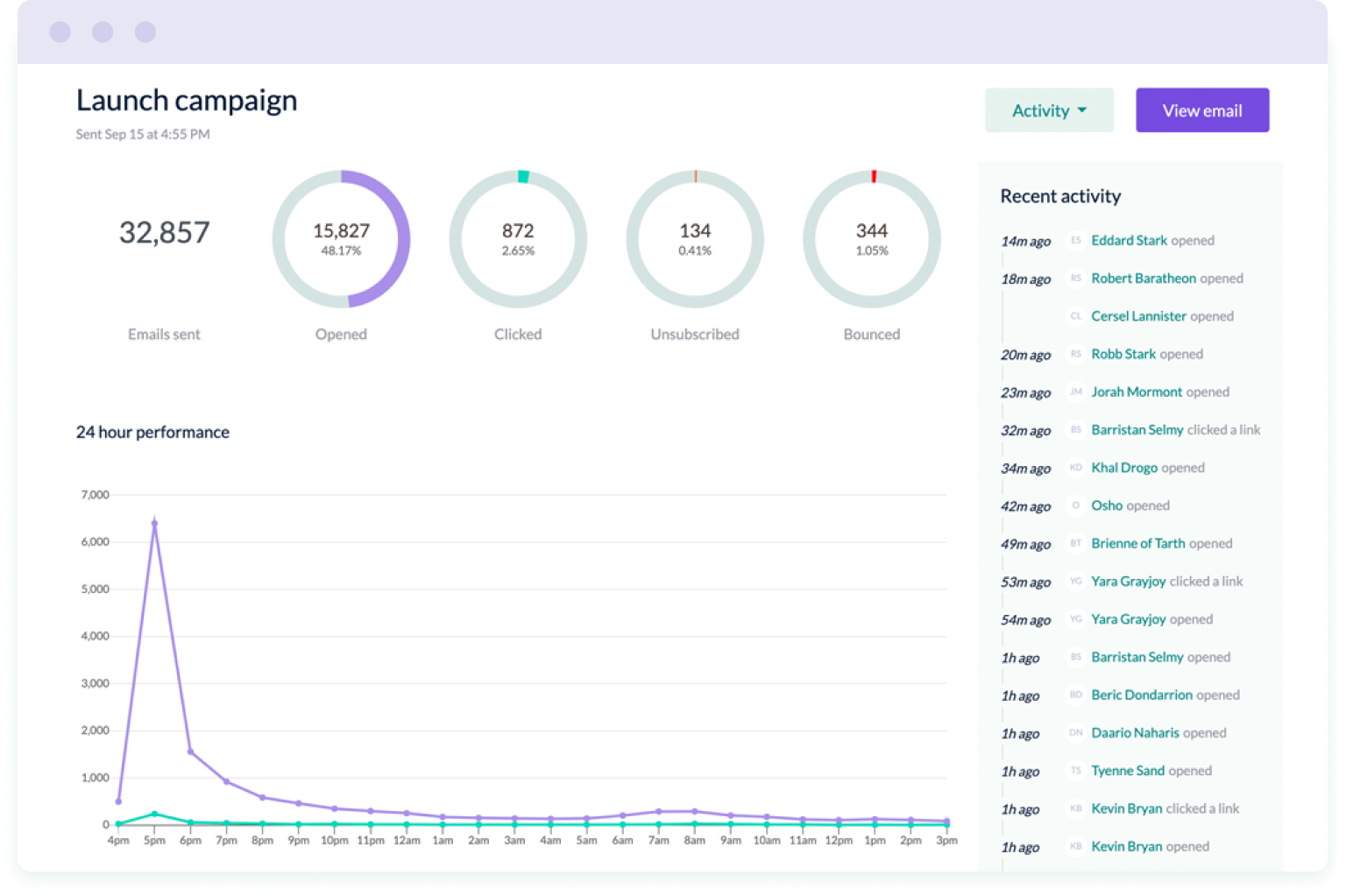
Standout Features
- Autoresponder builder. Create simple welcome email sequences and autoresponders within minutes;
- Easy-to-use interface. Minimal learning curve, ideal for beginners and small teams;
- Amazon SES Integration. Optional AWS setup to reduce the cost of operations.
Use Cases
EmailOctopus is perfect for small businesses and startups that need a no-frills newsletter tool. It’s great for:
- Bootstrapped startups. Run newsletters and send regular updates without complicating the operations;
- Affiliate marketers. Set up lead magnet autoresponders and track clicks from its simple analytics dashboard;
- Freelancers & creators. Grow your audience and send regular updates without increasing the cost of operations.
Competitive Edge
While many newsletter tools come with overcomplicated automation and CRM features, EmailOctopus stays lean and efficient. It’s one of the few platforms that keeps pricing low while still offering essential email marketing tools. The Amazon SES integration makes it cheaper than Mailchimp and other mainstream email service providers.
However, EmailOctopus isn’t for everyone. Support is limited after 30 days, and the automation features aren’t as advanced as platforms like other platforms.
I’ve been having a great time growing my first mailing list using EmailOctopus. It’s simple and easy to use, so I can spend more time on what matters (creating art), and you don’t have to spend money just to start out. I’m also very fond of the fact EmailOctopus respects the privacy of my followers. It really helps build trust with my audience.
— Fabiola from Capterra
Selzy – Email Marketing Platform Tailored for Small Businesses
Selzy is designed for business owners who appreciate simplicity and want to automate email campaigns without a steep learning curve. While it may not have the deepest customization, it gets the job done without unnecessary complexity or cost.
Pricing: Starts at $10/month for up to 1,000 contacts and unlimited emails | Free plan available.
Selzy makes email marketing accessible to small businesses. Its drag-and-drop editor is clean and easy to use, with 75+ pre-made professional templates to speed up campaign creation. You can also switch to an HTML editor for more control if needed.
Its pre-built automation chains allow businesses to quickly set up welcome sequences, list-based triggers, and subscriber tagging. Plus, real-time campaign tracking helps monitor email performance over time.
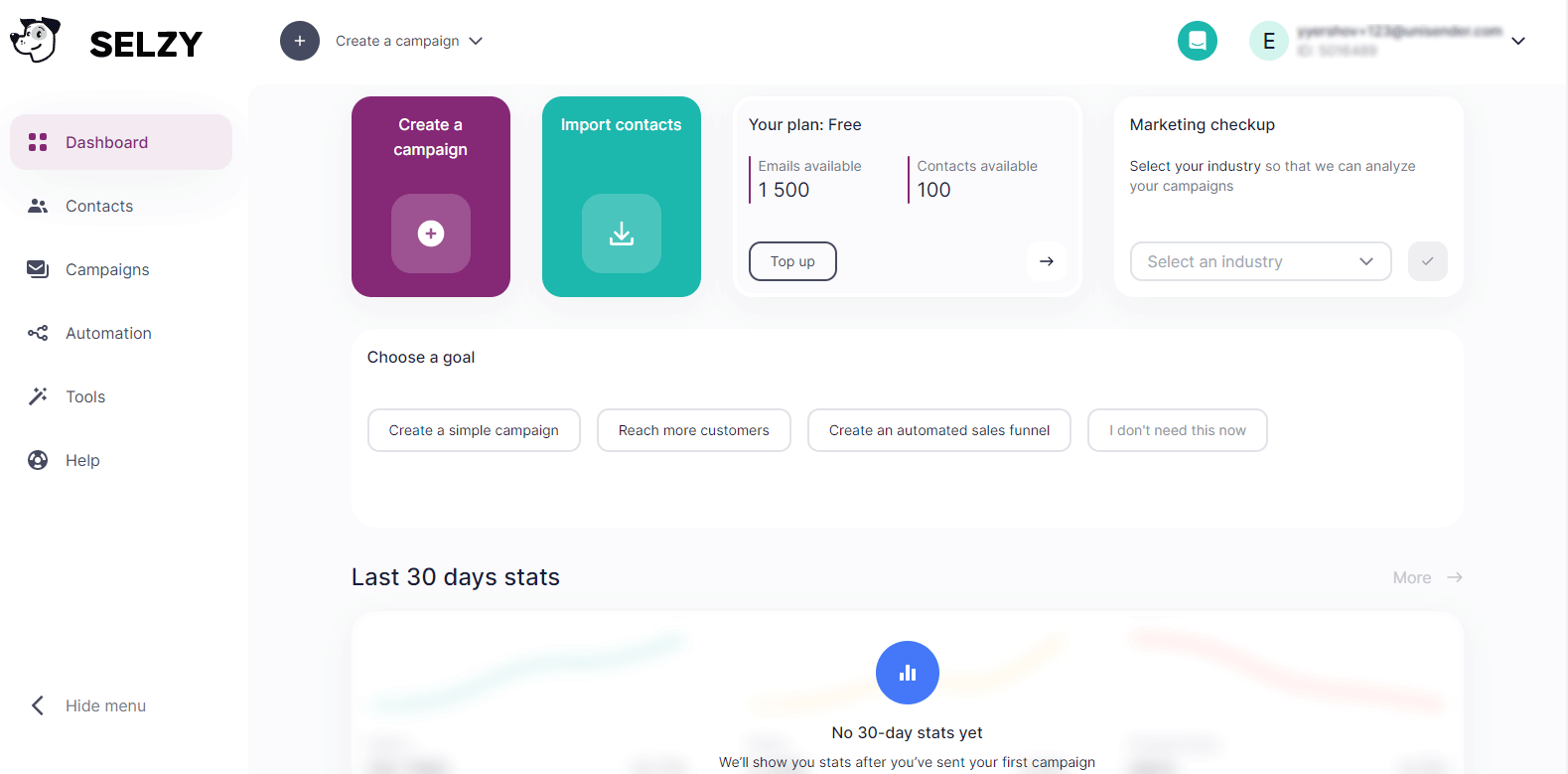
Standout Features
- Pre-built automation chains. Get started with ready-made workflows or build your own;
- Simple & fast email editor. Create emails quickly using an intuitive drag-and-drop builder;
- Reliable support. 24/7 customer service plus an email marketing course to help beginners get started quickly.
Use Cases
Selzy is great for small businesses that need a no-fuss email platform looking to automate their email operations without complications. Some of the applications we could think of include:
- Local businesses. Run newsletters and promotions without spending a lot of time on learning;
- Freelancers & solopreneurs. Set up automated follow-ups, nurture leads, or provide regular updates;
- Early-stage startups. Streamline customer engagement using automated welcome sequences and nurture sequences.
Competitive Edge
Unlike platforms that lock essential features behind expensive plans, Selzy keeps pricing accessible—even offering unlimited emails on the lowest plans. If your priority is a user-friendly, automation-ready email tool that won’t overwhelm you, Selzy is a smart pick for small businesses.
However, it’s not for power users. If you need advanced segmentation, deep analytics, or custom workflows, platforms like Sender offer more flexibility.
Selzy is light weight application for email management. Selzy has lots of capabilities like email tracking, adding signature, protect from spam and much more. I’m using this for email automation. Inbuilt saves time in email content writing and make content authentic and professional.
— Ayushi from Capterra
Mailmodo – Leading Solution for Interactive Emails
Mailmodo is a unique email marketing tool that helps you send fully interactive emails. You can create AMP emails where your subscribers can fill out forms, book meetings, or complete surveys directly inside the email—without clicking away.
Pricing: Starts at $39/month for up to 2,500 contacts and up to 20,000 emails/month | 21-day free trial available.
Mailmodo helps you create more engaging and action-driven emails. It has a no-code drag-and-drop editor to create any kind of AMP and HTML emails. You can also embed interactive widgets like calendars, carts, surveys, and spin-to-win games inside emails.
There’s even a visual automation builder that helps set up email sequences triggered by subscriber actions, while API and webhook integrations allow advanced customization.
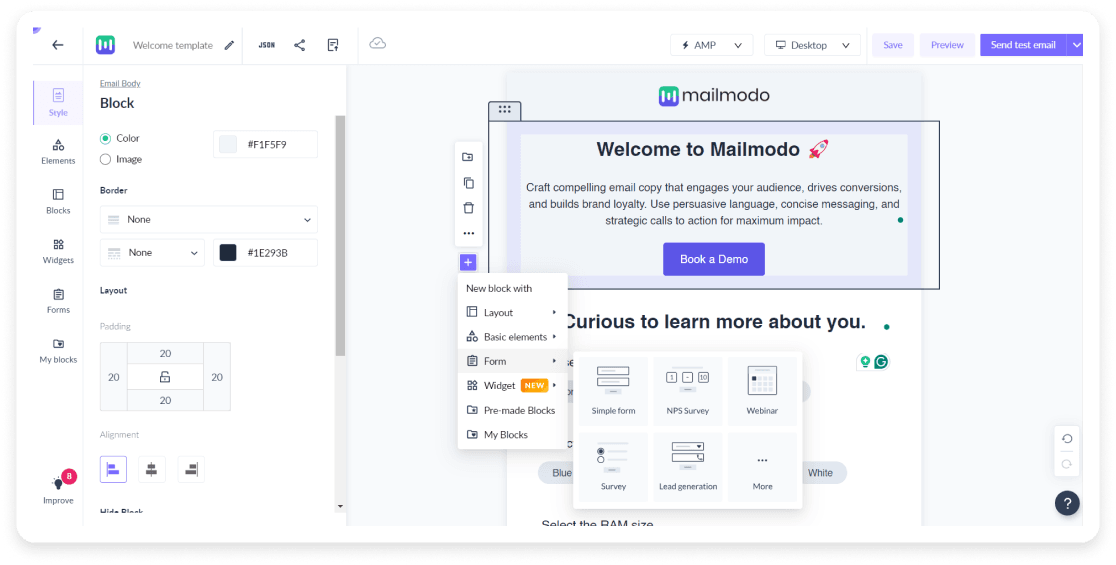
Standout Features
- AMP emails. Create interactive emails that let subscribers take action inside the email itself;
- Drag-and-drop editor. Easily design AMP and HTML emails without coding skills;
- AI subject line generator – Create and A/B test subject lines automatically for improving the results.
Use Cases
Mailmodo is ideal for businesses that want to increase engagement and conversions with interactive emails.
- B2B & SaaS companies. Capture leads and schedule meetings directly through emails by embedding a calendar;
- Ecommerce stores. Embed carts, interactive quizzes, and product recommendations for faster checkouts;
- Marketing agencies. Add surveys within emails to collect customer feedback directly from the inbox.
Competitive Edge
Mailmodo redefines what email marketing can do for a business. While competitors like ActiveCampaign and Drip offer automation features for ecommerce, Mailmodo’s AMP-powered emails allow users to take action inside the email itself, reducing friction and boosting conversions.
If you want to send next-generation interactive emails that drive real engagement, Mailmodo is a game-changer.
Liked the easy AMP implementation. I was looking for such ways to make the mail more interactive and found your software at the very right moment. I like the templates and mails are easy to create. I am still learning to use it efficiently though.
— Arshi from Capterra
What to Look for in an Email Marketing Solution?
Choosing the right email marketing app can affect your campaign management capabilities and the overall ROI. With so many email newsletter service providers available, it’s essential to evaluate tools based on key features that align with your business needs.
Here are the must-have features to look for when selecting an email marketing automation platform:
- Email lists. Your choice should promise easy list management, including importing, exporting, grouping, and bulk cleaning features, to optimize bulk services and improve results from your email blast software;
- Signup forms. Look for an email marketing platform with a built-in form builder to capture leads and streamline email blast services without relying on additional tools;
- Customer segmentation. Choose platforms with advanced email segmentation for targeted drip campaigns and deeper personalization of every email campaign;
- Email automation workflows. Prioritize tools with pre-built automation for drip campaigns, follow-ups, and lead nurturing, to save time and improve efficiency;
- Integration with other tools. Select a solution that integrates with CRMs, analytics, and ecommerce tools, ensuring seamless functionality.
Free Email Marketing Services for Small Business
If you’re searching for the best free email marketing platforms to start, we’ve compiled a list of providers who offer 100% free plans. These free email platforms can help you kickstart your operations without a dent in your pocket.
| Platform | Free emails per month | Subscriber limits | Best feature |
| Sender | 15,000 | Up to 2,500 | Premade automated workflows |
| MailerLite | 12,000 | Up to 1,000 | Email verification |
| EmailOctopus | 10,000 | Up to 2,500 | Email design builder |
| Omnisend | 500 | Up to 250 | Multi-channel campaign builder |
| Selzy | 1500 | Up to 100 | AI email builder |
Sender excels with a generous free plan that includes automation and high send limits, but lacks a landing page builder.
MailerLite offers email verification and a sleek drag-and-drop editor, though advanced automation is locked behind paid plans.
EmailOctopus provides a lightweight, budget-friendly email builder, but comes with fewer automation and segmentation options.
Omnisend allows multi-channel marketing (email, SMS, and push) even on the free plan, but the monthly email sending limit is low.
Selzy features an AI-powered email builder and beginner-friendly automation, but the subscriber limit is too restrictive for scaling.
Also read: 13 Cheapest Email Marketing Platforms for Savvy Marketers
FAQs about Email Marketing Platforms
What is an email marketing service?
An email marketing service helps you create, send, and manage email campaigns for your subscribers. It provides tools for designing emails, scheduling campaigns, automating follow-ups, and analyzing your marketing performance. You can use these platforms for executing your email marketing strategy and sending different types of email campaigns, like promotional campaigns, personalized reminders, abandoned cart recovery emails, etc.
How to choose the best email marketing software?
Picking the right email marketing platform starts with identifying your needs. Look for features like advanced personalization, automation, and an intuitive interface to streamline your campaigns. An email tracking software with detailed analytics, such as open rates and click-through rates, is essential for evaluating performance effectively. Also, remember scalability is key—ensure the platform can grow with your business. Finally, choose a platform with an intuitive email template builder for designing professional emails easily.
What are the best free email marketing services?
There are lots of free email marketing tools with amazing features without hefty charges. Some of the most promising ones you can try are Sender, MailerLite, EmailOctopus and Omnisend. They all come with useful features to start and grow your email list. Sender even offers advanced automations on the free plan for up to 2,500 subscribers.
What’s the best email platform for a small business?
Sender is a top choice for small businesses due to its user-friendly interface, affordable pricing, and robust features like a drag-and-drop email builder, professionally designed templates, tracking analytics, and automation capabilities.
It integrates well with other tools, offers high deliverability rates, and ensures mobile optimization, making it an excellent platform for managing and growing email marketing campaigns.








